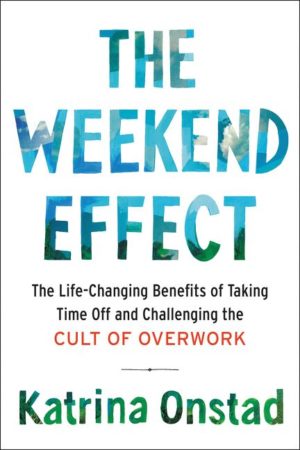Our expert Katrina Onstad is the author of The Weekend Effect. She came up with the idea after her young son had commented, after one hectic weekend, that it hadn’t felt like a weekend, prompting her to re-examine her priorities.
How often do you have a proper weekend? And when we say ‘a proper weekend’, we mean a glorious stretch of free time unencumbered by plans, pulsing with possibility. Rare as hen’s teeth? We thought as much. So many of us rush through the week looking forward to two days of freedom only to be faced with a shopping list of tasks, from paying bills to doing the laundry and answering work e-mails.
So then it’s no wonder that we’re often hit with a dose of the dreaded Sunday-night blues. It’s not just that we’ve got Monday morning to face, but that the weekend was such a let-down and a missed opportunity. Without the space to tune out and recharge, we’re lacking in joy, adventure and meaning – the very stuff that fuels our inspiration for work and keeps our friendships vibrant.
What makes a weekend great is entirely up to you, but the key thing is to leave a little space. Weekends feel best when they’re relaxed, with room for spontaneity. So read on to discover six steps to help you reclaim those precious 48 hours…
ALSO SEE: Why You Should Take More Quiet Time
1 Put down the tech
Stand back from your smartphone. In fact, add a signature to your e-mail that says you don’t respond after 7pm or on weekends, then switch it off. If your job requires you to post on social media constantly, do as Katrina does and set it up to post automatically over the weekend. Choose a time frame that works for you – a tech blackout from Friday night to Saturday night, say – and stick to it religiously. If you work for yourself, setting clear boundaries around when you will and won’t work is even more important.
TIP: If a deadline is pressing, set aside a clear block of time in which to finish the job so that your work doesn’t spoil the whole weekend.
2 Connect with people
The word ‘connection’ has been co-opted by technology, but catching up on Facebook is not the same as actually seeing someone. Research reveals that we’re eating together less, throwing fewer parties, and that one-third of us has no interaction with our neighbours at all. But we’re wired to be social and our natural reflex is to connect. Seeing friends face-to-face rather than through the interface of a screen makes us feel happy. In one study, happiness was more closely tied to feeling connected than it was to education or wealth. Loneliness, on the other hand, is worse for our health than cigarettes or obesity. So we need to get off social media and return to old-school socialising. If your family has lost the habit of eating together, reestablish the traditional Sunday lunch. The point isn’t to showcase your cooking skills, but to enjoy the conversation and help deepen your relationships.
TIP: If your friends are busy, break out of your usual circle – invite the parents of your child’s play-date friend in for a spontaneous glass of wine, or drop in on a neighbour.
3 Care
Giving up your time to do something charitable – anything from baking for the neighbourhood market to manning the phones for a good cause – might sound like a kamikaze move for reclaiming your weekend. In fact, the opposite is true – donating time for the good of others won’t just help you feel good but, according to a 2012 psychological study, it could make the weekend feel longer, too. Do-gooders have more time on their hands – at least that’s how it feels.
TIP: Become an activist for a cause you believe in and let the passion of others rub off on you.
4 Play
When it comes to the weekend, the temptation is to veg out. And we don’t just watch one episode of a TV show, but binge-watch the whole series. We’ve got ‘spectatoritis’ – and, like fast food, passive consuming leaves us feeling a bit sick and grumpy. Doing something active or creative can boost how you feel, leading to a drop in stress hormones. Pounding a treadmill does not count as ‘play’. Try something social like joining a running club where you can connect with other people.
TIP: Next time you want to just veg out in front of a screen, Google local activities in your area; for every passive activity, do two active ones.
5 Do less
We get it, the house needs cleaning, meals must be cooked, the grass won’t mow itself, and if you’re a carer, you can’t just stop caring – but you can do less. Less shopping, less cleaning, less decluttering. In fact, don’t make plans, make space – space for the things that make life meaningful. Redistribute weekend chores throughout the week. Clean one room a day, if you must, and put a cap on time spent on housework at the weekend. No one ever lay on their deathbed wishing they had done more cleaning.
TIP Delegate. Chores are good for kids, as they help them develop self-reliance.
6 Seek beauty
› Being in awe of beauty, in nature or in culture, is one way to feel as if we have more time at the weekend, as it brings us into the present moment. Walking in nature reduces rumination (urban walkers don’t get the same benefit). Listening to music or visiting art galleries can help us feel a sense of calm and belonging; brain scans show that exposure to a beautiful artwork can trigger the release of the feel-good chemical dopamine in the pleasure centre of the brain.
TIP: Become closer to nature. Watch a tree change through the seasons.

The Weekend Effect (Little, Brown), by Katrina Onstad

